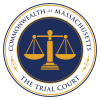- Trial Court Law Libraries

Article 30
In the government of this commonwealth, the legislative department shall never exercise the executive and judicial powers, or either of them: the executive shall never exercise the legislative and judicial powers, or either of them: the judicial shall never exercise the legislative and executive powers, or either of them: to the end it may be a government of laws and not of men.
Precedents, Following Law, and Quotations
Three Branches of Government
Baron de Montesquieue, The Spirit of the Laws, Translated by Thomas Nugent, (New York: Hafner Pub. Co., 1949). p.153-154. De L’esprit des loix was first published in 1748:
“When the legislative and executive powers are united in the same person, or in the same body of magistrates, there can be no liberty; because apprehensions may arise, lest the same monarch or senate should enact tyrannical laws, to exercise them in a tyrannical manner. Again, there is no liberty, if the judiciary power be not separated from the legislative and executive. Were it joined with the legislative, the life and liberty of the subject would be exposed to arbitrary control; for the judge would be then the legislator. Were it joined to the executive power, the judge might behave with violence and oppression. There would be an end of everything, were the same man or the same body, whether of nobles or of the people, to exercise those three powers, that of enacting laws, that of executing the public resolutions, and of trying the causes of individuals.”
James Madison, Federalist Paper No. 47, “The Particular Structure of the New Government and the Distribution of Power Among Its Different Parts” From the New York Packet, (1788), 2nd paragraph:
“The accumulation of all powers, legislative, executive, and judiciary, in the same hands, whether of one, a few, or many, and whether hereditary, self-appointed, or elective, may justly be pronounced the very definition of tyranny."
Rule of Law
Algernon Sidney, Discourses Concerning Government, Chapter 3, Section 11 (1683):
“[W]e must look for another rule of our obedience, and shall find that to be the Law, which being, as I said before, Sanctio recta, must be founded upon that eternal Principle of Reason and Truth, from whence the rule of Justice which is sacred and pure ought to be deduced, and not from the depraved will of man, which fluctuating according to the different Interests, Humors and Passions that at several times reign in several Nations, one day abrogates what had bin enacted the other.”
